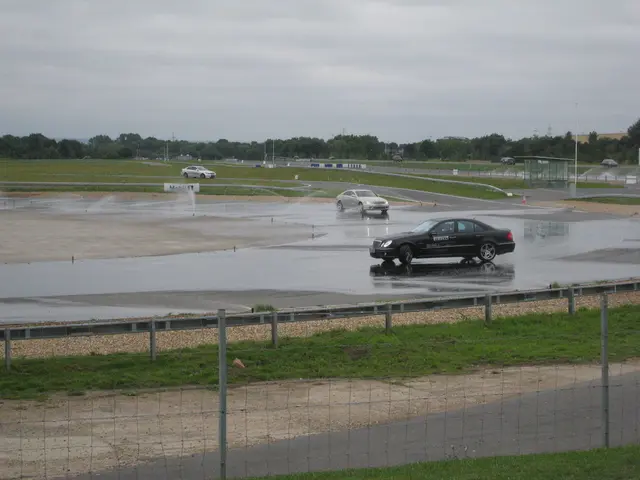Trouble begins on a negative trajectory.
Loose Coalition Grapples with Reliability and Trust Issues
It's a stormy start for the new German government, as the coalition partners find themselves on dicey ground. A divided nation watches as the coalition, consisting of the Christian Democratic Union (CDU), the Christian Social Union (CSU), and the Social Democratic Party (SPD), faces trust issues amid its unsteady beginnings.
The government formed after the February 2025 elections and took office officially on May 6th, with the leadership falling to Friedrich Merz of the CDU. Despite the historic meeting, the chancellor election process was less than ideal, with a rare second round vote taking its toll on the coalition's early days. So, does the Union have the "oomph" to make it work?
Federal Interior Minister Alexander Dobrindt, representative of the CSU, remains undeterred. He insists that, against all odds, the government has already shown the ability to tackle challenges and collaborate constructively. He's not shy about crediting the Greens and The Left for their assistance in the first round of the chancellor election.
There's obvious discontent from the opposition, however. Katharina Dröge, leader of the Green parliamentary group, believes the starting point for this coalition is anything but hopeful, claiming it is precariously balanced and requires immediate attention. In other words, the wheels need oiling, pronto.
While political scientist Julia Reuschenberg acknowledges some minor setbacks for the coalition, she highlights that the democratic process remained smooth. But concerns linger over potential ideological conflicts and policy disagreements that could undermine the coalition's cohesion.
Will the Left Join the Dance?
Unsurprisingly, there are limits to cooperation, even when the stakes are high. Thorsten Frei, the new Chancellor's Office chief, proposes reconsidering the incompatibility decision concerning the Left Party to accommodate the prevailing political climate. But Dobrindt remains unconvinced, with the suggestion of changing the decision based on necessity rather than principle.
With the Union not possessing the two-thirds majority needed in the Bundestag, the Green Party and The Left are crucial allies for certain projects – a fact that may force surprising alliances. The question of working with the far-right Alternative for Germany (AfD) is still off the table for the government, however, as Dobrindt reminds critics that procedural matters with The Left could still be under discussion.
The AfD Front and Center
The Union has faced mounting internal pressure to address its handling of the AfD, with Green politician Katharina Dröge calling for a clear stance. According to Dröge, the current climate is witness to two distinct factions within the Union, with Jens Spahn seen as aligning more closely with the AfD than with other prominent members. Dobrindt has denied the claims and expressed his intention to review the Federal Constitutional Protection Agency’s evaluation of the AfD.
Immigration: New Frontiers and old Battlegrounds
There's no time to rest on laurels for Interior Minister Dobrindt, who's already implemented notable changes in immigration policy. He proposes fortifying border controls, potentially resulting in increased overtime for federal police officers. Add in concerns that train stations might experience a dip in security, and you've got a complex immigration situation brewing.
Dobrindt also announced that asylum seekers attempting entry at the borders could be rejected by the police under certain conditions. However, vulnerable groups such as pregnant women, children, and other at-risk individuals would be granted exceptions. The EU has not been supportive of these measures, as noted by Merz during his visit to Poland on May 4th.
A Tumultuous Tango of Governance
Critics view the recent events as a chaotic period, citing inconsistencies between Merz's and Dobrindt's public statements and what appears to be a lack of coordination within the government. "Order and control look different" under the current administration, remarks journalist Melanie Amann of "Der Spiegel."
Dröge goes one step further, alleging that Dobrindt may violate European law with his border control measures, claims that Dobrindt refutes. In his defense, Dobrindt declares the attempts to "make the European situation work again," while acknowledging that they are seeking solutions that tackle the migrant issue and alleviate the burden on municipalities and public services.
[1] ntv.de, "Government Talk at Illner: "This Start is Under a Bad Omen"", 2025.[2] Tagesspiegel.de, "Experts: The New Government Can Bring About Stability", 2025.[3] Spiegel Online, "Union Must Clarify its Handling with AfD", 2025.[4] politico.eu, "Blome Drives for Chancellor: New Government "Doesn't Last as Long as the Traffic Light"", 2025.[5] Stern.de, "Coalition Agreement of the New Government: Challenges and Opportunities", 2025.
- Alexander Dobrindt
- Alliance 90/The Greens
- The Left
- CSU
- CDU
- Migration
- Amidst the turbulent start of the German government, discussions regarding the compatibility of The Left Party have resurfaced, with Alexander Dobrindt (CSU) maintaining his opposition to reconsidering the incompatibility decision.
- Representing the Alliance 90/The Greens, Katharina Dröge, calls for a stronger stance against the AfD and questions whether there exists a faction within the CDU/CSU alliance that aligns more closely with the far-right party.
- The European Parliament, European Commission, and the Council of the European Union have expressed concerns over the immigration policy adopted by the German government, specifically the border control measures implemented by Interior Minister Alexander Dobrindt (CSU).
- Despite the challenges and setbacks faced by the CDU/CSU and SPD coalition, political scientist Julia Reuschenberg highlights the smooth democratic processes employed during the formation of the government, while cautioning against potential ideological conflicts that could jeopardize the coalition's cohesion.








